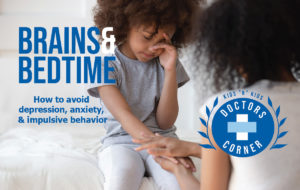How to Avoid Depression, Anxiety, & Impulsive Behavior

Researchers at the University of Maryland School of Medicine recently concluded a large, long-term study on the impact of sleep, or lack thereof, on elementary students’ brain development and physical and mental health, and the results weren’t dreamy.
The study, which followed almost 9,000 nine- and ten-year-old children, examined the differences between those who got the recommended 9-12 hours of sleep per night with those who got much less. What researchers found were significant discrepancies in the regions of the brain that control memory, intelligence, and emotional well-being. The study revealed that the children who got an insufficient amount of sleep had much higher incidences of mental health problems, including depression, anxiety, and impulsive behavior. These same children were also more likely to have trouble with memory, problem-solving, and decision-making, impacting areas from test scores and grades to behavioral challenges and social relationships. The negative effects of insufficient sleep were observed to persist for two years!
Experts agree that healthy sleep should be at the top of families’ list of priorities. Wondering how you can help your kids catch all the Zs they need? Establishing a calm, relaxing night routine is a great place to start for all children, say pediatricians. Lots of physical activity during the daytime, shutting off screens an hour before sleep, and maintaining a consistent bedtime are all other important steps parents can take to ensure quality shut-eye for growing brains and bodies.